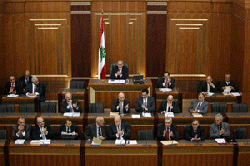BEIRUT – The three Lebanese governments formed during President Michel Suleiman’s five-year term have all been forced into existence due to external pressures.
The 2008 Fouad Siniora government was the result of the Doha Agreement. The 2009 Saad Hariri government saw the light of day due to a Saudi-Syrian reconciliation. The 2011 Najib Mikati government emerged after the collapse of this regional understanding.
After Mikati’s recent resignation, however, it is unclear what circumstances will force the formation of a new government, particularly given the fact that the constitution does not impose time limits on either the president to name a new prime minister, or the prime minister to form a government.
It seems clear that most of the political parties, which are divided between March 8 and 14, are not in any rush to form a new cabinet for a variety of reasons.
First, the president prefers to wait until the contending political forces come to some sort of agreement on the shape and role of the new government before initiating consultations to name a prime minister.

It doesn’t matter that there is a majority that supports a particular candidate – without the agreement of both March 8 and 14, the new prime minister will hit a wall and be forced to step down.
Since the Taif Agreement, presidents have generally moved rather quickly to name a prime minister as soon as a government collapsed. Suleiman has decided to break this practice this time around, particularly as the political parties have come to play a role in the formation of recent governments that is equal to the designated prime minister.
It seems clear that most of the political parties, which are divided between March 8 and 14, are not in any rush to form a new cabinet for a variety of reasons. Second, given that the preparations for parliamentary elections are due to begin on April 20 (two months before its term expires), no prime minister alone is capable of dealing with the contradictory demands that will be placed on any new government. The likely result will be an extension for parliament before the formation of a new government.
Third, both March 8 and 14 will not rush the formation of a government before determining what role it is meant to play internally and externally, in addition to what their position will be within it.
It is telling that neither side has put forward any names despite the fact that it has become customary since the time of Syrian rule to designate a prime minister almost immediately before or after the government resigns.
Even if a government is formed, it cannot last long as it will expire with the onset of the March 2014 presidential elections, thus making any new government a transitional one at best.
Fourth, both sides are now dealing with Mikati’s resignation coolly after some initial negative reactions from March 8 and celebration on the part of March 14.
His resignation does not appear to have changed the balance of power between the majority and minority in parliament. Rather, it appears that there will be two large minority blocs – March 8 and 14 – with a much smaller group of MPs headed by Mikati, and Druze leader Walid Jumblatt standing in the middle.
– Al Akhbar, TAAN






Leave a Reply